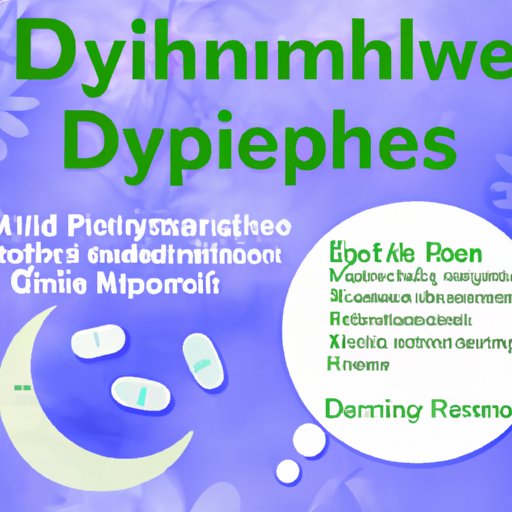I. Introduction
Diphenhydramine is an over-the-counter drug commonly used to treat allergies and cold symptoms. However, it is also known for its sleep-inducing effect. In this article, we will explore the science behind diphenhydramine’s sleep-inducing effect and whether it is an effective sleep aid.
II. Exploring the Science Behind Diphenhydramine’s Sleep-Inducing Effect
Diphenhydramine is an antihistamine drug that blocks the action of histamine, a compound produced by the body that causes allergy symptoms such as sneezing, itching, and runny nose. Histamine also plays a role in regulating wakefulness and sleep. By blocking the action of histamine, diphenhydramine can promote relaxation and drowsiness.
III. The Ultimate Guide to Understanding Diphenhydramine’s Sleepy Side Effect
Diphenhydramine’s mechanism of action involves blocking the H1 receptor, which is responsible for many histamine-mediated effects. This blockade can cause sedation and drowsiness, which is why diphenhydramine is commonly used as a sleep aid. However, the drug also has several side effects, including dry mouth, blurred vision, constipation, and urinary retention.
Most people who take diphenhydramine experience drowsiness and sedation as a side effect. This sedative effect may be more pronounced in older adults and can last for several hours after taking the drug.
IV. Using Diphenhydramine for Sleep: Pros and Cons
The pros of using diphenhydramine for sleep include its effectiveness in inducing drowsiness and promoting relaxation. It is also readily available over-the-counter and is relatively inexpensive. However, there are also several cons to using diphenhydramine for sleep. One of the most significant drawbacks is the risk of side effects, including dry mouth, dizziness, and blurred vision.
Another potential drawback of using diphenhydramine for sleep is the development of tolerance. Prolonged use of diphenhydramine can lead to decreased effectiveness, meaning that individuals may need to take higher doses to achieve the same sleep-inducing effect. Additionally, the sedative effect of diphenhydramine can last for several hours, making it difficult to wake up and function normally in the morning.
V. Is Diphenhydramine An Effective Sleep Aid? A Review of the Research
The effectiveness of diphenhydramine as a sleep aid has been studied in several scientific studies. One study found that diphenhydramine improved subjective sleep quality and reduced sleep latency in individuals with insomnia. Another study found that diphenhydramine was equally effective as zolpidem, a prescription sleep aid, in improving sleep quality.
However, it is important to note that the effectiveness of diphenhydramine as a sleep aid may depend on a variety of factors, including the individual’s age, gender, and health status. Additionally, individuals may develop tolerance to the drug over time, which can decrease its effectiveness as a sleep aid.
VI. The Truth About Diphenhydramine and Sleepiness: Debunking Common Myths and Misconceptions
There are several common myths and misconceptions regarding diphenhydramine and sleepiness. One of the most prevalent is that diphenhydramine is a natural sleep aid. However, diphenhydramine is a synthetic drug that works by blocking the action of histamine.
Another common misconception is that diphenhydramine is completely safe and has no side effects. However, diphenhydramine can cause several side effects, including drowsiness, dry mouth, and blurred vision. Additionally, individuals may experience an allergic reaction to the drug, which can be life-threatening in some cases.
VII. Conclusion
Diphenhydramine is a commonly used over-the-counter drug that has a sleep-inducing effect. However, it is important to be aware of the potential side effects of the drug and to use it only as directed. While diphenhydramine can be an effective sleep aid for some individuals, it may not be suitable for everyone. As with any medication, it is important to speak with a healthcare provider before using diphenhydramine for sleep or any other purpose.
